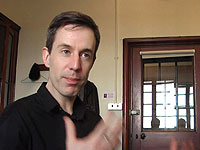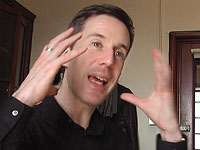English

In a previous article, I talked with Julian West, Head of Open Academy of the Royal Academy of Music (RAM), about the introduction of 'Music in Community' programme to its curriculum, from the view of the Academy's role in the community and its students. In this article, the interview moves on to discuss the details of the programme.

'Music in Community' course is one of the compulsory classes for students from the third year of the undergraduate course at the RAM. It consists of 12 lectures and a placement. In the fourth year of undergraduate study, it is an elective class and accepts a maximum of 12 students. Students learn advanced level leadership and designing projects through 22 lectures and three projects. Since last year, we have started to offer elective classes for postgraduate students and teach more practical matters through, for example, participating in workshops over several days. We do not have students who major in this field, but they all have another major of their own, such as string instruments and composition.

Yes. In fact, there are some students who become very interested and actually lead workshops after they graduate from here, but the Academy's main thrust for this programme is for its students to learn about 'being performers', and to discover what they and their instruments have to contribute to people and the community. In that sense, all of the Academy's students are required to take this class when they are in the third year of their undergraduate course.
For most Academy students, the field of 'Music in Community' course is new to them, so the lectures for the third year students are an introduction to the field. First of all, I tell the students that what we do in this field is different from both 'going to give a concert at a school' and 'teaching people how to play a musical instrument', and that we have to place it somewhere in the middle. It takes quite a while for what I mean to sink in for a lot of students and for them to make sense of it, until they have practical experience. That makes a placement such a crucial part of this course.
There are lectures about the basics when you do community music activities. What is this field of work? What is the history? What is the Government policy about it? About the outreach programmes organised by the local government, arts council, orchestras, concert halls, and other arts organizations, and how the musicians are tied to them.

Then, thinking about how they can be involved with this field in their future career, I ask the students to think about very simple questions: 'How do you introduce yourself and your instruments to the audience who have never seen the instrument before?', 'How do you explain to the audience about the piece you are about to play; for example, what is interesting, why you love this piece, and why you want to play it to them, using your knowledge and personal connection to the piece?' Most of the audience are interested in why 'you' want to play that piece of music.
Apart from the lectures I give myself, I invite guest speakers from as wide a range of fields as possible, who represent each field of work. Most of them are actively involved as freelance workshop leaders in the field that our students might be involved with later on, such as orchestras, concert halls, opera companies, and festivals. They come and talk about what kind of work they do, and sometimes they actually lead projects in the class with the students as participants. By sitting on the children's chairs, the students can see and think about what the children are learning here, how they are learning, and what factors make that learning possible.

Third year students have one placement each. It last about six hours, and can be done in one or two days in the same place. Four to six students and a workshop leader, myself or someone external, form a team, and go to local schools most of the time, and sometimes to the museums or concert halls. One placement per year seems to be short, but it is actually hard work to arrange a placement for every one of the 75 students in a year.
I have meetings with the music consultants for Westminster or Camden Council, and discuss and design how we can join together what the Council encourages to develop and what the Academy's community projects can offer. They recommend 10 to 12 schools every year which they believe will get most out of it. It is the combination of regular and new schools.
For the schools, the project is free. The students do not get paid but get academic credits. The basic fee for the project, including the workshop leaders and props, is funded purely through the Academy budget as part of the training. When we do collaborative projects with external arts organizations, such as Wigmore Hall, we share the costs. If we become involved with projects which are not directly about training our students, we have to raise money for that.
It is various. As for the fourth year or above, it is elective, so only those who are enthusiastic choose to come. However, as for the third year, it is compulsory, so their attitudes vary. Especially at the beginning of the year, some are keen, while other think that they are not very interested but have to be there because it is compulsory. But, in the course of the year, they come to understand what this field of work is about, and have actual experience with children through the placement, and by the end of the year, I believe that nearly 99% of the students see the interest and think it is a positive experience.
As I mentioned before, it has become an opportunity for most of the students to discover/ rediscover their identity as performers - who they are, why they decided to learn music, and why they chose their instrument. They also realize through dealing with children's reactions that they actually can have a much bigger impact on them than they thought, and that what the audience is getting from your performance is beyond their imagination. In a sense, the students who had not expected that kind of thing tend to experience a wide range of changes in their attitude through discovery.

No, I do not see any difference between what instruments they major in, but rather in their individuality. And also, in the UK, as it has been a while since orchestras and other arts organizations started their outreach programmes, recent students from the UK have experienced those themselves while they were in schools, so they remember what is it like and it seems to lead them to a deeper understanding. It is still a barrier for international students to overcome, but once they get the idea, some of them are very excited about the big impact on them, and want to take it home.
It is ideal that a pianist works as a pianist but, in reality, it does not always work like that. Many of the schools we visit have a piano, which is not in a good condition, though. There are schools which have a room for music, but there are many others which bring the musical instruments on trolleys into their classrooms when they need them. In addition, we request a larger space so that we have a lot of space to move around, and the children can feel the change of atmosphere, so we do not always have a piano in the very room we use for the workshop.

What do pianists do if there is no piano? That is their opportunity to think about 'What skills do I have as a musician?', 'What musical knowledge and skills can I bring to them?' For example, when you make music with children using percussion instruments, there is plenty of knowledge and skills you can use as a musician, without playing the piano. Having an ear as a musician, knowledge about the piece of music, understanding of the musical structure, a sense of ensemble, knowledge and experience about how music is put together, instinct and sense as a musician, etc. These experiences give the students re-realization and confidence about 'being musicians'.
It is that the 'quality of the performance' makes a real difference. Here is an example. One day, a violin student visited a nursery and played some familiar nursery rhymes such as 'Twinkle twinkle'. The children clapped their hands and enjoyed the songs. Then, she was asked, 'What are you practicing now?', and she answered, 'the violin concerto by Sibelius'. The children asked her to play it. When she started to play its first movement, the children's reaction was different from when they listened to the nursery rhymes, but they were totally amazed, with their mouths open, and fascinated by her playing of the violin.
That is one of the most important thing the students should learn as a musician. It is about bringing the best to offer as a musician into any context; it is no different whether it is a traditional concert hall or a primary school. Through that, music can have a real impact on people, and people can have a real artistic experience. Even though the children have no idea what the piece of music is about, they see there is something important in it, and it really means something, through seeing the way in which the musician is involved with the music.

It is that we have a wonderful partnership with various people and arts organizations of a high standard. Our students can learn and get experience from those who provide high quality music for community projects, such as Wigmore Hall, the Orchestra of the Age of Enlightenment, and Spitalfields Music Festival. Another thing that is unique to the Academy's programme is it is tied in very strongly to the students' sense of themselves as performers. It is absolutely about you and your identity as a musician. Through those experiences, I believe that our students can develop an ability to perform to their best, not only on concert platforms, but also in different settings, and build their identity as a musician, as well as an artist.
(Next, I will report on how the workshops go.)
Report: Chigusa Futako








